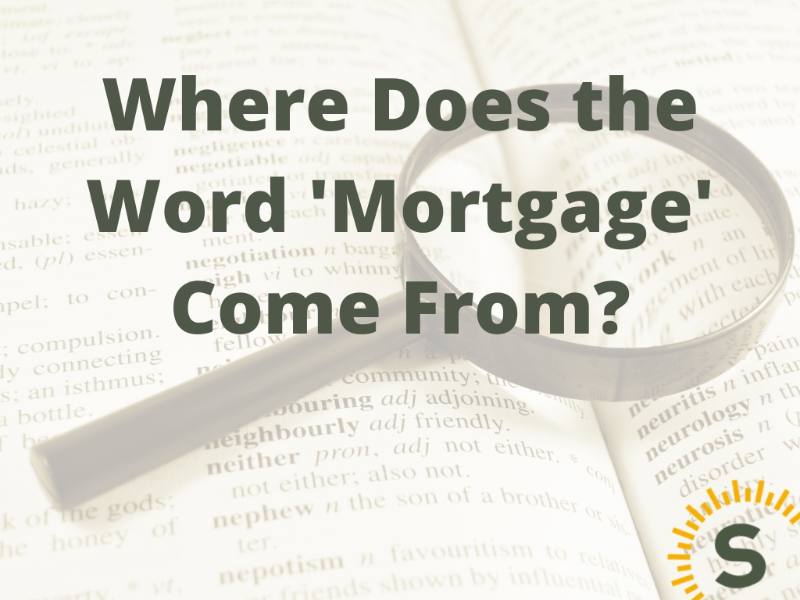
Have you ever wondered where the word 'mortgage' comes from? It's a term we are using everyday at the moment, but its origins may surprise you and are kind of funny if you enjoy dark humour.
In this insight, learn about the dark history of where the word mortgage comes from, also know as Mortgage Etymology.
The word 'mortgage' actually has its roots in the Latin language, specifically from two words: 'mortuus' meaning 'dead' and 'gage' meaning 'pledge'. So, when you break it down, a mortgage can be seen as a 'dead pledge'.
But what does that mean exactly? Well, in ancient times, when someone borrowed money to buy a property, they would pledge their property as collateral. If they failed to repay the loan, the property would be considered 'dead' to them, as it would be taken by the lender. Over time, this concept evolved into what we now know as a mortgage. So, the next time you hear the word 'mortgage', you can impress your friends with this interesting bit of history.
The word 'mortgage' has a fascinating etymology that takes us back to ancient times. As mentioned earlier, it derives from the Latin words 'mortuus' and 'gage'. The term 'mortuus' means 'dead', while 'gage' refers to a pledge or a promise. When combined, these words form 'mortgage', which essentially describes a pledge that becomes 'dead' if the debtor fails to fulfill their obligations.
To understand the evolution of the modern mortgage industry, we need to delve into its historical background. The concept of borrowing money against property dates back thousands of years. In ancient Egypt, people would use their land as collateral to secure loans. If they were unable to repay the debt, they would forfeit their property to the lender.
This practice continued throughout history, with variations in different cultures. In medieval Europe, for example, lords would provide land in exchange for military service or other obligations. The land could be taken back if they failed to fulfill their duties, creating a similar 'dead pledge' situation.
The modern mortgage industry as we know it today began to take shape during the 17th and 18th centuries. As economies grew and trade expanded, the need for secure and reliable lending practices became apparent. Financial institutions started to emerge, offering loans specifically tied to real estate. These loans would be secured by a mortgage, which allowed the lender to foreclose on the property if the borrower defaulted on their payments.
One significant development during this period was the establishment of land registries. These registries provided a centralised record of property ownership and mortgage details, ensuring transparency and reducing the risk for lenders. With the advent of standardised mortgage contracts and legal frameworks, the mortgage industry became more accessible and widespread.
Digging deeper into the origin of the word 'mortgage' uncovers some intriguing facts. The term 'mortgage' was first recorded in English in the 14th century, during the time of Chaucer and the Middle English period. However, the concept of borrowing against property predates the specific term 'mortgage' by thousands of years.
In ancient Rome, for example, the concept of a mortgage was known as 'vadium' or 'vadimonium'. This practice involved the borrower giving possession of the property to the lender until the debt was repaid. If the borrower defaulted, the lender would have the right to sell the property to recover their investment. The concept of a 'dead pledge' can be traced back to this ancient Roman practice.
The word 'mortgage' has become deeply ingrained in our society and culture. It symbolises the pursuit of homeownership, financial stability, and the achievement of the 'American Dream'. For many, obtaining a mortgage represents a significant milestone in life and a step towards building a secure future.
The mortgage industry also plays a vital role in the overall economy. It provides access to capital for individuals and businesses, stimulating economic growth and investment. The availability of mortgages can drive demand in the real estate market, influencing property prices and shaping urban development.
From a linguistic perspective, the future of mortgages may see the emergence of new terms and vocabulary. As the industry adapts to changing customer needs and market dynamics, the language used to describe mortgages may evolve. Concepts such as 'smart mortgages' or 'digital mortgages' may become more prevalent, reflecting the integration of technology into the mortgage process.
In conclusion, the word 'mortgage' carries a rich history and holds great significance in today's society. Understanding its etymology and historical context helps us appreciate the role it plays in the world of real estate and finance. While misconceptions and negative associations exist, it's crucial to recognise the opportunities and benefits that mortgages provide.
As we navigate the future, the mortgage industry will continue to evolve, driven by advancements in technology and changing consumer preferences. The language used to describe mortgages will likely adapt to reflect these changes, but the fundamental concept of a 'dead pledge' will remain at the core. So, the next time you hear the word 'mortgage', or are in a pub quiz being asked, where does the word mortgage come from? Remember its ancient origins, dead pledge, and the journey it has taken to become an essential unfortunate part of our lives.
Source: The Online Etymology

Stuart is an expert in Property, Money, Banking & Finance, having worked in retail and investment banking for 10+ years before founding Sunny Avenue. Stuart has spent his career studying finance. He holds qualifications in financial studies, mortgage advice & practice, banking operations, dealing & financial markets, derivatives, securities & investments.





Our website offers information about financial products such as investing, savings, equity release, mortgages, and insurance. None of the information on Sunny Avenue constitutes personal advice. Sunny Avenue does not offer any of these services directly and we only act as a directory service to connect you to the experts. If you require further information to proceed you will need to request advice, for example from the financial advisers listed. If you decide to invest, read the important investment notes provided first, decide how to proceed on your own basis, and remember that investments can go up and down in value, so you could get back less than you put in.
Think carefully before securing debts against your home. A mortgage is a loan secured on your home, which you could lose if you do not keep up your mortgage payments. Check that any mortgage will meet your needs if you want to move or sell your home or you want your family to inherit it. If you are in any doubt, seek independent advice.